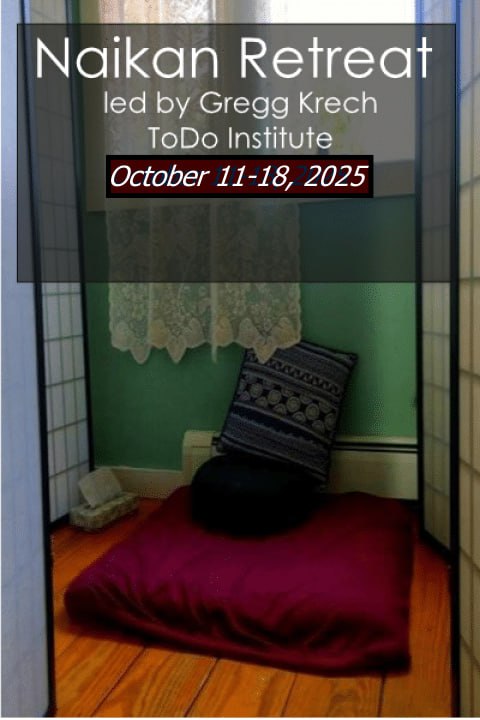“The ToDo Institute is a hidden gem, offering profound tools and perspectives on coping with life. Having done the Naikan Retreat and the Residential Certification Program, I continue to grow in my personal, spiritual and professional life. As an allopathic physician, I highly recommend their programs to all physicians who are interested in more patient/person centered care.” — Robert Strayhan, M.D.
or call us at
(802) 453-4440
Naikan is a practice of self-reflection originally developed in Japan.
Most people are born, live and die without ever taking the time to truly reflect on how they have lived their lives. In our busy lives it is hard to find time for serious, quiet reflection. But to fail to look closely at the reality of our lives is to ignore what Reality can teach us. This retreat provides an unusual opportunity to step back and examine your life.
What Does the Process Involve?
Naikan is a Japanese word which means “inside looking” or “introspection.” A more poetic translation is “seeing oneself with the mind’s eye.” It is a structured method of self-reflection that helps us to understand ourselves, our relationships and the fundamental nature of human existence. Naikan was developed by Ishin Yoshimoto, a devout Buddhist of the Jodo Shinshu sect in Japan. The basic structure of Naikan involves reflecting on our relationship with others using the following three questions:
- What Have I received from this person?
- What Have I given to this person?
- What Troubles and Difficulties Have I Caused This Person?
These questions provide the basic foundation for an examination of a person’s entire life.
What our Participants Are Saying
“Thank you for holding such a beautiful and sacred space for us this week. Your creation of quiet, clean, space was such a respite for my soul. I felt nourished by your humble service as well as by the lovingly prepared, nutritious victuals. I feel gratitude. I thank you all for your piece in my peace. I promise to nurture the seeds sown here to a fruitful, bountiful harvest of love and gratitude.”
—Katie McDonald, Portland
“Amazing. I expected nothing and received so much. This has made me aware of another, better way to look at and be with each person I know, meet and don’t know. I truly look forward to tomorrow where before I didn’t want to get out of bed.”
—Ryan Rogers, Enfield, CT
“I am eternally grateful to all of you for making one of the most difficult, profound and exquisitely beautiful experiences of my life possible. Thank you all greatly. I am deeply moved.”
—Kathy Dean, Charlemont, MA
Location and Costs
Most retreats are held at the ToDo Institute in Monkton, Vermont. The ToDo Institute is a non-profit educational center that specializes in Japanese methods of psychology and mental health. The center has offered Naikan retreats and training since 1989.
The cost of the retreat ranges from $620 to $795, depending on membership discounts and time of payment. Room & Board included.
or call us at
(802) 453-4440
Naikan Guides

He is the author of numerous popular books, including Naikan: Gratitude, Grace & the Japanese Art of Self-Reflection, The Art of Taking Action, Question Your Life, Tunneling for Sunlight and A Natural Approach to Mental Wellness.
Blending the psychological, the practical and the spiritual, Gregg Krech promotes values such as gratitude, acceptance, mindfulness, compassion, constructive action and purposeful living. He currently lives in Vermont with his wife (with occasional visits from his two college daughters). He enjoys writing haiku, baking bread and playing blues piano.

As a licensed social worker, Linda has extensive experience applying the principles of Japanese Psychology to those who have serious mental illness through her work as director of a psychiatric rehabilitation program. She also has a special interest in the application of Japanese Psychology to parenting, relationships and food.
Linda is the author of Little Dreams Come True: A Practical Guide to Spiritual Parenting, and is a regular contributor to Thirty Thousand Days. She loves biking, calligraphy, trees, vegetarian cuisine, and studying the wisdom of the ages.


